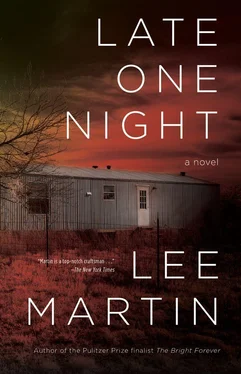“Sugar, listen to him.” Brandi slipped her arm around Ronnie’s and held on. “I’m right here,” she said, and she squeezed his bicep with a fierce grip that made fire shoot up his arm.
Pat didn’t know any other way to deliver the news but to say it straight out.
“Ronnie, there’s been a fire,” he said. “The trailer’s gone, not much left but the gas furnace and the hot water heater.”
“They were having trouble with that furnace,” Ronnie said. “Della’s dad was supposed to fix it.”
“I don’t know anything about that,” said Pat. Then he gathered himself for the next thing he had to say. “Missy saw the flames from our place, and she called 911. By the time I got up there, Shooter Rowe and Captain were already doing what they could.”
Ronnie said, “Thank God Della and the kids weren’t there. Good thing they went to her folks’ tonight.”
Pat let him have that one moment of comfort, that brief time of believing that no one had been inside the trailer. Then he started in again. He took it slow. He let Ronnie have time to take in each thing he was saying. “They were there,” he said. “Della was in the trailer, and she was seeing to the kids. She was handing Emma to Shooter when I got there. Angel and Hannah were already out. Then Sarah. Then—”
“They were there?” He couldn’t believe it. He’d called from the payphone at Casey’s, and no one had answered. Della’s car hadn’t been in the lane the way it always was. He’d gone out there to burn the trailer — that’s how mad he’d been because Della had filed papers on him — but he hadn’t intended anything like this. “She got them all out, right? Della? She got all the kids out?”
Just then, a clock on the wall marked the hour — one o’clock — with birdsong. A robin’s happy call: Cheerup .
Brandi explained that the clock had a light sensor to keep it from sounding when the room was dark. She pointed up. “Ceiling light,” she said, to make it clear why the clock had sounded.
Pat knew he couldn’t take any of the pain from Ronnie. All he could do was say the rest.
“Della went back for Emily and Gracie and Junior. By that time, the fire was too hot, the smoke was thick.” The orange sock hat slipped from his hands, and he had to bend over and pick it up from the floor. “I couldn’t go in there, Ronnie.” His voice was nearly a whisper now. “The roof and walls were already starting to go. If I could’ve done something. If I’d been there sooner.”
Ronnie felt, then, like he was somewhere far, far away from where he really was, and, when he finally spoke, it was like he was listening to someone he didn’t know — someone who was a stranger to him.
“Not one of them?” he asked Pat. “Not Della or Emily or Gracie? Not Junior?”
When Pat didn’t answer right away, he turned to Brandi. She reached out and laid her hand to Ronnie’s cheek. “No, sugar. Not a one.”
Then Pat found his voice again, and he said the hardest thing of all. “The roof and the walls. They just went before Della could get the others.” He remembered how the heat had forced him and Shooter and Captain and the four saved girls out into the road, where they could do nothing but watch the trailer collapse and listen to the sirens on the fire trucks as they came out the blacktop from town. “They’re gone, Ronnie. Della and the baby and Emily and Gracie. They’re all gone.”
It was said now — everything — and Pat waited for whatever would come next.
Ronnie got a hard look to his face. That gaunt face with the sharp cheekbones and the watery blue eyes and the little knob of a chin that wasn’t much of a chin at all. He looked the way he had the first day he’d come to Bethlehem School, a new kid. He was no more than seven or eight, then, and yet he looked like an old man fretting something to death.
He took a few steps across the room, and for a moment Pat was afraid he was coming to do him harm with his fists, enraged because Pat had stood as witness to the fire. Then Ronnie stopped, and he said with a no-nonsense tone, “Where are my girls?”
“They’re at my house,” Pat said. “Missy’s seeing to them.”
Ronnie turned to Brandi. “I’ve got to go there. I’ve got to be with them.”
She nodded. “I’ll get dressed.”
“Brandi.” He stopped her as she started toward the bedroom. He reached out a hand. “Baby?”
She came to him and she threw her arms around his neck and pressed him to her, saying, “Sugar. Oh, sugar.”
They stood there, rocking back and forth a little, and Pat, watching, didn’t know what to do with this tenderness between them on such a night. “I guess sometimes, the hurt’s so big,” he’d say to Missy later, “nothing matters except getting over it.”
He’d tell her about the way Brandi held onto Ronnie and told him she’d do whatever she needed her to do. “If you want me to stay here,” she said, “I will. I’ll be right here waiting for you to come back.”
“I expect that’d be best,” he said.
He knew she was offering to stand by him, the way she would if she were his wife.
That word was strange to him now. It flamed inside his head and got all twisted up with what he felt for Brandi and the child she carried — his child — and the life he’d shared with Della until he’d decided to walk out of it. He’d had this wife and seven children, and now three of them were dead, and Della too, and it made no sense — it nearly brought him to his knees — that they were gone and he was alive.
Shooter Rowe, if push came to shove, would admit that deep down there were times when he wished to be free of Captain, when he wished for a different sort of son.
It was the kind of truth a man comes up against late at night when he’s alone with his thoughts, and he has no choice but to face facts. When he has to say, okay, this is who I am. The fact was, ever since he and Merlene knew something was wrong with Captain, that he wasn’t ever going to be the sort who could stand on his own two feet and take responsibility for his steps through the world, sure or uncertain, Shooter tried to stay clear of him, wasn’t a good father at all. But then Merlene took sick and died, and now here he was, trying his best.
Captain was incapable of understanding when he’d done something to deserve a stern word or a lick with Shooter’s belt. It was so much easier to call Ronnie on his missteps. When he did something stupid, Shooter told him he’d fucked up, and Ronnie said, “Shooter, you’re right. If I’d had you as a daddy, I would’ve turned out to be a better man.”
Shooter wasn’t sure about that — he was no kind of father — but he knew that to Ronnie he must have seemed exactly the man he needed to keep him on the straight and narrow.
Ronnie had never known his own father. Then his mother died when he was a toddler, and he grew up in a series of foster homes, each one of them leaving him with a little more meanness inside, a little more hurt, a little more ache for comfort and love. Finally, when he was fifteen, he lied about his age and got that tattoo on his neck. BAD MOON. Let the world know it; he was burning a short fuse.
So there they were, Ronnie and Shooter, each of them all mixed up, needing each other in ways they couldn’t completely understand, ways that were complicated by the love and envy they both felt, and Shooter didn’t know how he’d say any of this if he had to.
“You just fucked up big time,” Shooter told Ronnie after he walked out on Della.
It was a night when Ronnie had come for the last of his things and Shooter caught him as he was about to toss a pile of clothes into the backseat of the Firebird. It was after dark, a quarter moon in the sky, the air with the chill that said winter was waiting, the chirr of crickets in the fencerows, the smell of wood smoke coming from the trailer.
Читать дальше












